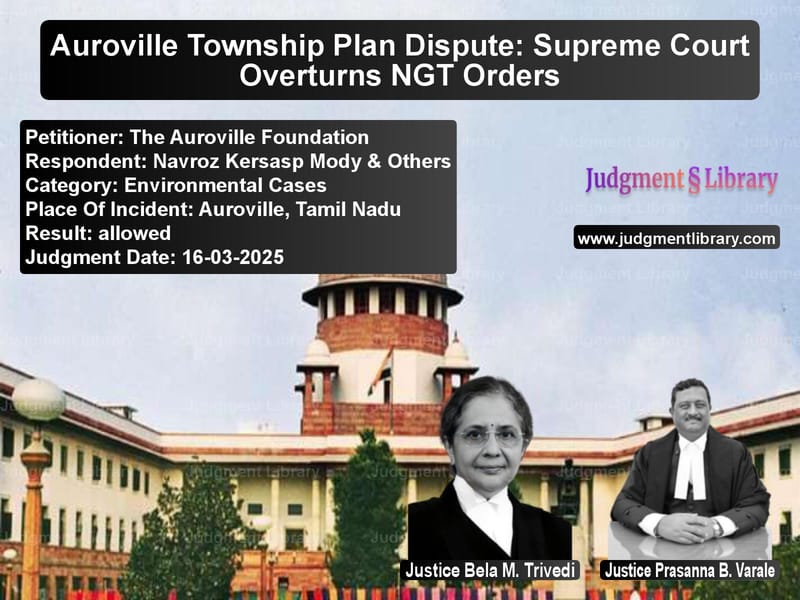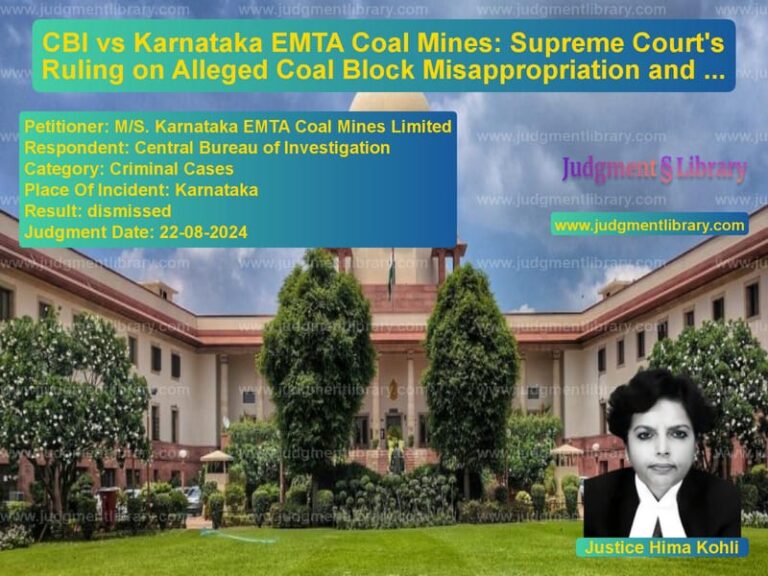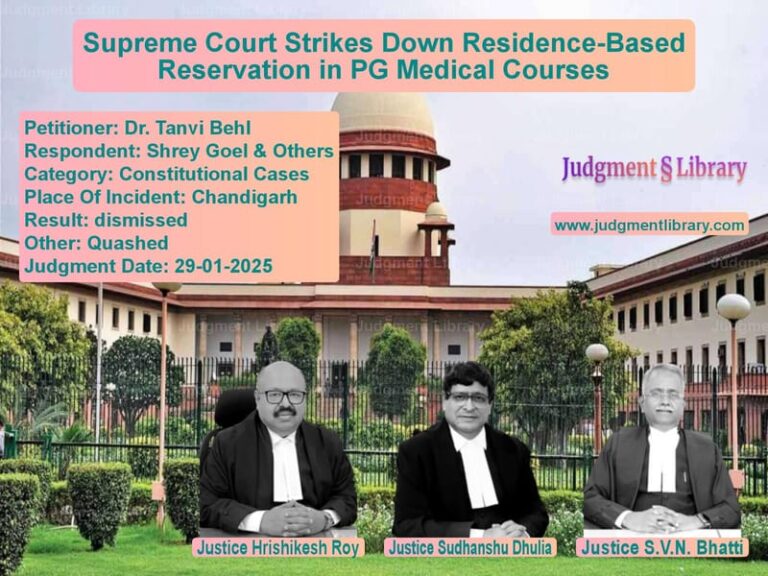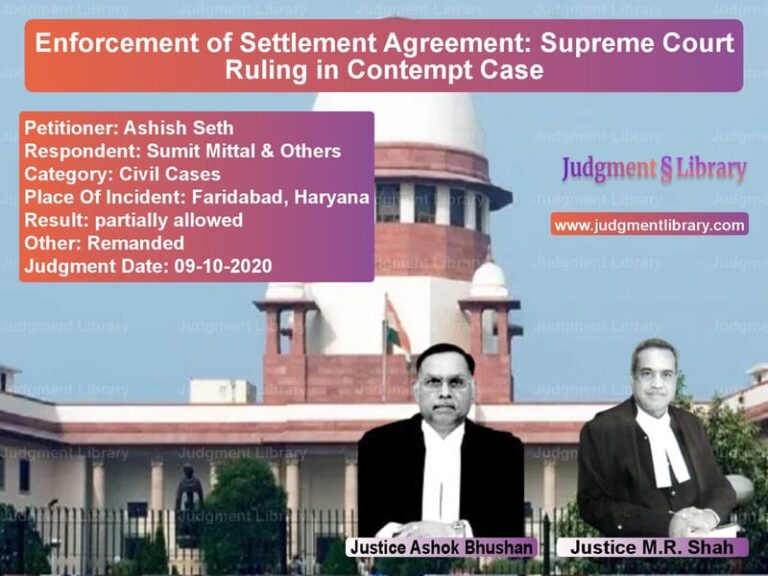Auroville Township Plan Dispute: Supreme Court Overturns NGT Orders
The long-standing legal battle over the development of the Auroville township reached a turning point with the Supreme Court’s decision in The Auroville Foundation vs. Navroz Kersasp Mody & Others. The case revolved around whether the National Green Tribunal (NGT) had the jurisdiction to issue environmental directives regarding the Auroville Township’s development plans. The Supreme Court ruled that the NGT overstepped its authority by interfering in a legally approved Master Plan.
Background of the Case
Auroville was established as an international township based on the vision of Mirra Alfassa, known as ‘The Mother’, who sought to create a universal city promoting human unity. The township was legally formalized under the Auroville Foundation Act, 1988. The dispute arose when the Auroville Foundation, following the approved 2001 Master Plan, initiated construction of roads such as the ‘Crown Road’ and the outer ring road. A group of residents challenged the plan, citing environmental concerns.
The National Green Tribunal (NGT), Chennai, ruled in favor of the objecting residents, restricting further construction and directing the Foundation to obtain environmental clearance before proceeding. The Auroville Foundation appealed this ruling before the Supreme Court.
Petitioner’s Arguments (The Auroville Foundation)
- The Master Plan was legally approved in 2001 and published in the official gazette in 2010.
- The NGT lacked jurisdiction to interfere in town planning matters that had already been sanctioned.
- The land in question was never classified as a forest and did not require clearance under the Forest (Conservation) Act, 1980.
- The construction activities were in line with the original vision of Auroville and did not violate any environmental laws.
Respondent’s Arguments (Navroz Kersasp Mody & Others)
- The construction of the roads, particularly the Crown Road, was causing deforestation and environmental degradation.
- The project should require environmental impact assessments as per the Environment Protection Act, 1986.
- The area should be treated as a ‘deemed forest’ under Supreme Court rulings in T.N. Godavarman Thirumulpad vs. Union of India.
- The NGT had the authority to intervene under the Precautionary Principle to prevent irreversible environmental damage.
Supreme Court’s Observations
The Supreme Court meticulously analyzed the jurisdiction of the NGT and the legality of the Auroville Master Plan. The Court ruled:
“The Tribunal has completely misdirected itself by interfering with the implementation of the Master Plan, which was already approved by the competent authority way back in the year 2001.”
“The jurisdiction of the NGT extends only to cases involving substantial environmental violations under the laws specified in Schedule I of the NGT Act. The present case does not meet that criterion.”
The Court noted that the Auroville project had commenced before the 1994 and 2006 EIA Notifications, which meant that the Master Plan did not require retrospective environmental clearance. The ruling emphasized that the ‘Precautionary Principle’ could not be arbitrarily applied without legal backing.
Most Important Verbatim Arguments from the Judgment
“In the absence of a demonstrated violation of any statutory environmental obligation under Schedule I of the NGT Act, the Tribunal’s interference in the town planning process is legally untenable.”
“The approved Master Plan of Auroville has attained statutory force, and courts must not obstruct its implementation without compelling legal grounds.”
“While environmental protection is a priority, it must be balanced against developmental needs, particularly when projects have been duly approved by competent authorities.”
Final Judgment and Conclusion
The Supreme Court set aside the NGT’s orders, restoring the Auroville Foundation’s authority to continue its developmental activities under the approved Master Plan. The Court ruled that:
- The NGT lacked jurisdiction to halt the construction of roads within the Auroville township.
- The ‘deemed forest’ argument was inapplicable as the land had never been classified as such in government records.
- Development must adhere to environmental laws, but regulatory compliance does not necessitate unnecessary legal hurdles.
- The Auroville Foundation could proceed with its development plans without requiring fresh environmental clearance.
This judgment provides legal clarity on the role of environmental tribunals and affirms that judicial intervention in town planning must be exercised within legal limits. The ruling upholds the delicate balance between sustainable development and environmental protection while ensuring that legally sanctioned projects are not unduly obstructed.
Petitioner Name: The Auroville Foundation.Respondent Name: Navroz Kersasp Mody & Others.Judgment By: Justice Bela M. Trivedi, Justice Prasanna B. Varale.Place Of Incident: Auroville, Tamil Nadu.Judgment Date: 16-03-2025.
Don’t miss out on the full details! Download the complete judgment in PDF format below and gain valuable insights instantly!
Download Judgment: the-auroville-founda-vs-navroz-kersasp-mody-supreme-court-of-india-judgment-dated-16-03-2025.pdf
Directly Download Judgment: Directly download this Judgment
See all petitions in Environmental Cases
See all petitions in Public Interest Litigation
See all petitions in Landlord-Tenant Disputes
See all petitions in Judgment by Bela M. Trivedi
See all petitions in Judgment by Prasanna Bhalachandra Varale
See all petitions in allowed
See all petitions in supreme court of India judgments March 2025
See all petitions in 2025 judgments
See all posts in Environmental Cases Category
See all allowed petitions in Environmental Cases Category
See all Dismissed petitions in Environmental Cases Category
See all partially allowed petitions in Environmental Cases Category







